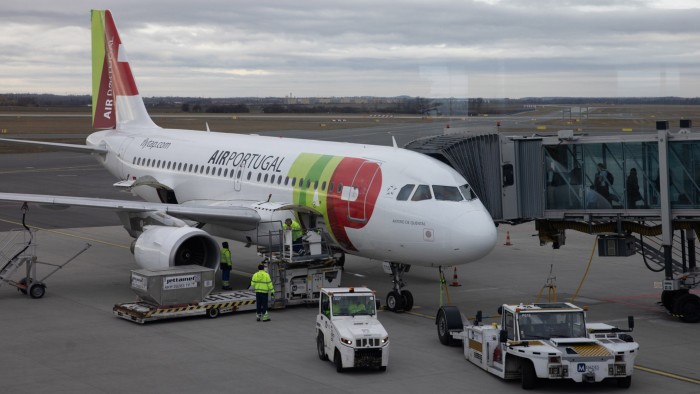Stay informed with free updates
Simply sign up to the Airlines myFT Digest — delivered directly to your inbox.
Portugal has relaunched the privatisation of its flagship airline TAP, saying it wants to sell 49.9 per cent of the business in a move that opens the way for a potential bidding war.
Prime Minister Luís Montenegro’s announcement on Thursday restarts a long-delayed process that had previously attracted interest from Europe’s three big airline groups: International Airlines Group, Air France-KLM and Lufthansa.
Montenegro, a centre-right leader who began a new term in June, said he was “convinced that there will be many interested parties” drawn to the airline, which serves 86 destinations in 31 countries.
TAP offers particularly strong links to Brazil and elsewhere in the lucrative South American market, as well as connections to Africa through routes to Angola and Mozambique.
But the privatisation plan, which includes reserving 5 per cent of the 49.9 per cent for employees, is less radical than earlier versions, which contemplated selling up to 100 per cent of the company.
The government said it would consider bids from any kind of entity, including airlines and investment funds, from anywhere in the world.
It said candidates must present a strategic plan to ensure the growth of TAP, the preservation of its brand, the maintenance of Lisbon as a hub and the continuation of routes to North and South America and Lusophone African countries.
Miguel Pinto Luz, infrastructure minister, said TAP would be managed by its new private minority shareholder, adding the shareholder must sign an agreement with the government that sets out the areas of “strategic choice” where the state may intervene, including key routes and the location of TAP’s headquarters.
The privatisation was first initiated by the centre-left government of António Costa in 2023, when financial advisers valued TAP at between €800mn and €1.1bn. The process was halted when Costa resigned over corruption allegations against government officials.
It restarted when Montenegro took power in 2024 but was suspended again earlier this year when he became embroiled in an ethics scandal that forced him to call an election.
Montenegro stressed that “if the objectives set by the government are not met, the privatisation will be suspended”.
The possibility of TAP being acquired by IAG, which owns Spanish airline Iberia, had prompted worries in Portugal that Lisbon would be downgraded to a spoke airport serving Madrid.
TAP was last privatised in 2015 but the collapse of air travel during the pandemic brought it to the brink of failure.
The government chose to save it in June 2020 with a nationalisation plan approved by the European Commission. The rescue aid totalled €3.2bn of loans and loan guarantees, and led to a forced restructuring.
After posting a record €1.6bn loss in 2021, TAP returned to profit the following year and had record earnings of €177mn in 2023. It made €54mn last year.
IAG, Air France-KLM and Lufthansa have each said they are looking for acquisitions. This month, Air France-KLM increased its stake in Scandinavian Airlines from 19.9 to 60.5 per cent.
Ben Smith, chief executive of Air France-KLM, told the Financial Times last week that the SAS deal did “not at all” affect the company’s ambitions to acquire TAP.
Additional reporting by Carmen Muela in Madrid and Ian Johnston in Paris

